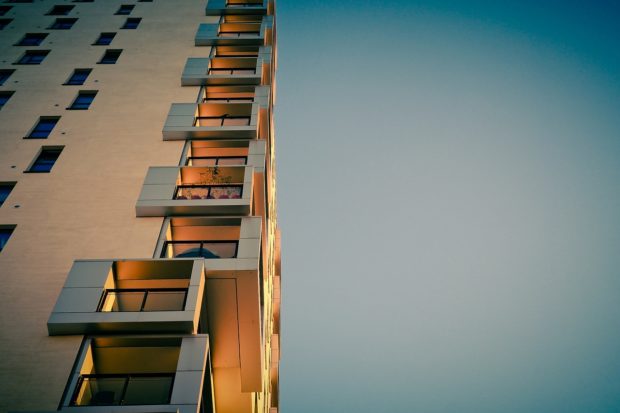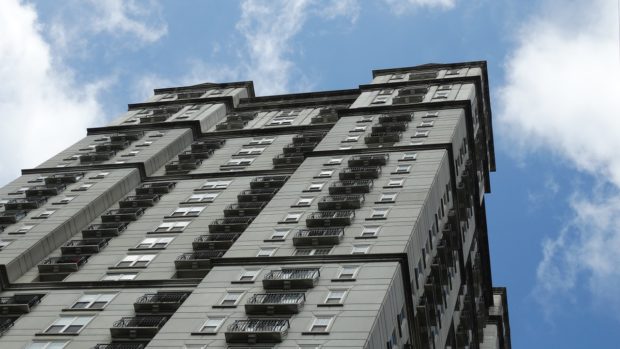Large buildings are a marvel of modern technology. Skyscrapers of the twenty-first century serve as artistic and functional sculptures, with the former being most peoples’ driver. I’ve heard numerous stories of renters or owners making a decision on space due to the cool factor, only finding the functional shortcomings after moving in. One of the most detrimental shortcomings we can run into is the noisy building.
Housing thousands of people in a square block or two brings with it noise concerns, and those concerns should find themselves at the top of your list. Whether tenants are living, working, or playing in the building, they expect a certain level of privacy to accompany their space, and whether or not management pays attention to acoustic aspects is going to be a make or break when it comes to tenant satisfaction.
Most large buildings are going to house a mix of residential and commercial tenants and may be occupied to some extent by a hotel. Each segment has its own needs. Noise stresses us out, and three places we don’t need additional stress are at home, at work, and on vacation.
Live
For the people who live in the building, the reasons for expecting peace and quiet may be fairly obvious. At the end of a hard day or long week, most of us like to relax in our favorite couch indent and watch a little tube. When that recharge is interrupted by noisy neighbors or street noise creeping in through the windows, it can be tough to recoup the energy lost through living our busy lives. Buildings with good acoustic design are made to keep all sounds where they belong.

The noise that drifts over from other units is one of the chief complaints in densely populated buildings. It’s nice to know your neighbors, but we all like to keep private conversations private. When you can hear everything that’s happening on the other side of the wall, it can strain relationships and add stress to your life. Not only will your noisy neighbors keep you up all night, but you may find yourself siding with one person over the other in the argument. It’s all a distraction no one wants. Keep the awkward arguments at the dinner party where they belong.

If you live in a building that houses businesses and hotels, you already know how much volume people bring with them wherever they go. Hotels are places where people like to let loose, much to the chagrin of the overworked residents who share the building. Separate entrances and elevators can keep you sane through the busy seasons and provide the separation that will allow you to sleep when that large wedding party books an entire block in your wing.
Work
Large buildings are a great option for growing companies. They can typically house the entire workforce in one building, and there is significant room for expansion. As businesses outgrow their spaces, they can expand to another floor, rather than to another building. This convenience comes with the distractions and lost time brought by noise.
According to the CDC, 22 million US workers are exposed to hazardous noise levels at work. While prolonged exposure to noise can damage our hearing, the more immediate results are going to be a drop in productivity.
Clutter is a productivity killer, and audio clutter is just as bad as physical clutter. Studies have shown that productivity plummets in noisy environments. And the noise that’s most distracting is a conversation. When you’ve brought all your employees into the same space, there’s no way to avoid it. While you’re not going to keep it out entirely, a savvy landlord can minimize the impact noise has on your business with the incorporation of thoughtful acoustic solutions, such are eco-friendly acoustic panels for example.
Play
Sometimes we all need to get away from our noisy jobs and hectic lives. Staying in a beautiful hotel can rub your pleasure sensors the right way or it can rub you the wrong way. One of the biggest complaints on visitors’ lists is, not surprisingly, noise pollution. A big hotel can be great for bringing lots of luxuries to your door, but can also present endless sources of noise that can put a damper on even the happiest camper’s stay. We forget all about that gorgeous foyer fairly quickly when we’re lying awake in a noisy room till the wee hours.
When people are inundated with stimuli for an extended period, solid rest becomes essential to making it through the weekend. A good hotel should keep outside road and pedestrian noise to a minimum. A facade engineer will best handle this aspect when the building is being constructed, but there are steps that can be taken to keep sound out of older buildings as well. Even sealing any gaps or air leaks will go a long way to keeping noise isolated, leading to more restful, relaxing stays.
That said, we expect hotels to have a bar and/or club, which is going to create noise if it’s a place worth visiting. If you are spending your evenings out, maybe you want to pregame before hitting the road or hit the bar for a nightcap when you return to the hotel. Maybe you want to head down early for breakfast and a stocked bloody bar. While we expect the hotel bar to be there, we generally don’t want it directly below or adjacent to our rooms. A well-planned hotel won’t place the bar next to the rooms in the building design. If the bar is too near to the guest rooms, it should be utilizing acoustic solutions, which dampen the sound in the room, allowing guests to converse at lower volumes. They will reduce noise at multiple levels.
City living is a noisy existence, and people pay good money for a little solitary space in all the madness, so creating an audio oasis will always impress. Absorbing and reflecting sounds in all the right spots can save money in construction costs and keep renters content. And, let’s face it, keeping happy tenants for the long haul is the name of the game.
